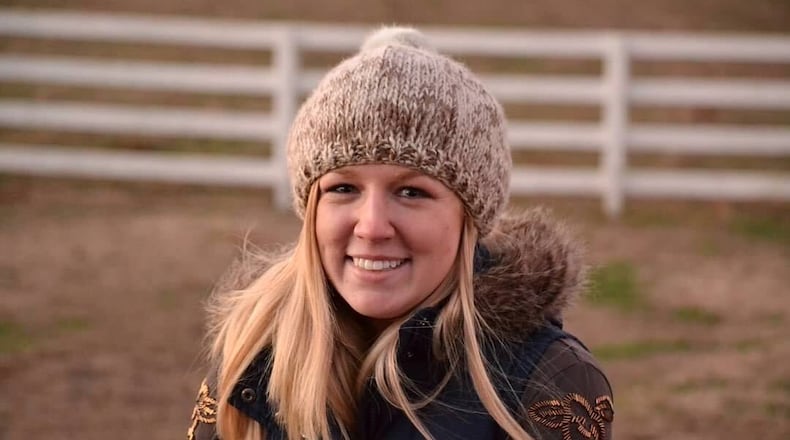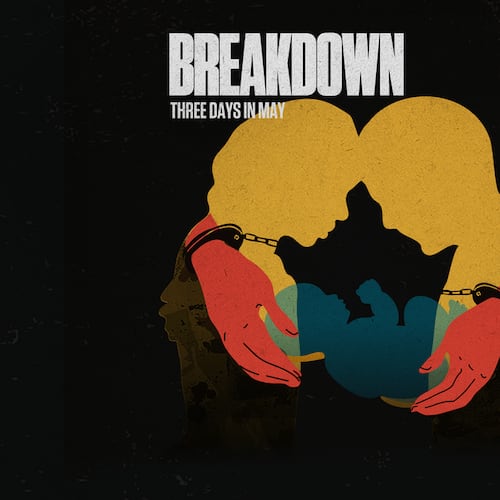Alexandra Faerber had just finished the night shift. But, before heading to her apartment on that morning in late March, she made a stop at her parents’ house in Brookhaven.
Still wearing her navy blue scrubs, the Atlanta nurse stood at a distance from her mother and father, mindful that her work might have exposed her to the coronavirus.
With the number of diagnoses in the area climbing, she wanted to make sure they were being careful. Just 27 years old, she seemed less worried about her own health.
But, within a week, Faerber would be the one in trouble.
Rushed to Atlanta Medical Center after her mother found her collapsed on the floor of her apartment, Faerber would die six days later.
» COMPLETE COVERAGE: Coronavirus in Gerogia
Her death, the cause of which has yet to be determined, has left her family and friends with agonizing questions that could take months to answer, if ever.
Some suspect the young nurse fell victim to the COVID-19 pandemic, though she’s not included in the official count at this time. Her case demonstrates the hazards of trying to calculate the true toll of the coronavirus. Tests can be wrong — swabs can fail to pick up virus and test kits can fail to recognize it, especially if testers err with the testing steps. And which deaths hospitals, medical examiners, doctors and nursing homes include in the tally can vary in practice as they weigh symptoms and the patient’s history.
The United States just passed 100,000 recorded COVID-19 deaths, with close to 2,000 coming from Georgia. But experts fear the real numbers are far higher. At the moment, Faerber’s case is one of thousands of data points in the pandemic that raise more questions than they answer.
Though her symptoms were flags for the coronavirus, she tested negative in the hospital.
“What that family can know is that those tests have false negative results,” Dr. Harry Heiman, a professor at the School of Public Health at Georgia State University, said when told the outlines of Faerber’s case. “Most public health experts would agree that the numbers we’re seeing are a significant undercount.”
Health officials have issued guidance and held webinars trying to explain when to include COVID-19 as a cause of death. But even if a patient has COVID-19 symptoms and dies, without a positive test result, the death could be attributed to another cause, such as a lung condition or diabetes. Different states even have different rules: Alabama officials told The Washington Post in mid-April that, if a diagnosed COVID-19 patient died of stroke, they could exclude COVID-19 as a cause of death. But COVID-19 is now known to cause some strokes.
“There’s the official death count, which basically includes people who were identified as COVID deaths, but we know that there are others who aren’t recorded as such,” said Ben Lopman, an epidemiologist at Emory University.
All about the patients
Two years ago, Faerber took a job working for a staffing agency that supplies nurses to Emory Healthcare. She liked the flexibility a staffing agency afforded — she could work in other cities if she wanted.
Several months ago, she was assigned to work as a nurse at Emory’s Long Term Acute Care Hospital on Candler Road. Such facilities treat patients who need hospital-level care, such as ventilators, but require longer stays than regular hospitals. The patients are often elderly.
» MORE: False-negative tests may cloud picture of coronavirus spread in Ga
Her parents were not surprised she was drawn to working with older adults. Even as a child, she always looked forward to school trips to a nursing home. After being paired up with a nursing home resident during one of those trips, she wrote the woman uplifting cards in between visits.
A young, energetic woman with blond hair, blue eyes and perfect smile, Faerber seemed well-suited for the extraordinary days that lay ahead.
She was hardworking, kind-hearted and perennially upbeat.
She was also encouraging, to patients, friends and co-workers, said Sueriah Jones, a 20-year-old patient care tech who worked with Faerber.
“She believed if you are positive, and you send out positive energy, you will get it back,” Febby Faerber said of her youngest daughter. “She would say to me, ‘You think I’m a hippie,’ and I said, ‘No, I love that attitude.’”
As a child, she stood up for children being picked on. And, as an adult, she supported her parents’ volunteer efforts with resettled refugees.
“She was a cheerleader for the underdog,” said her mother.
No one was surprised she decided to become a nurse.
“She really took pride in being a nurse. And she didn’t talk about the activities, like, ‘I put in 18 IVs.’ It was all about the families and her patients,” said Ashley Mooney, one of Alexandra’s two sisters. “A lot of her patients were unable to speak because of their condition.”
When a patient died, she felt it deeply.
“I would tell her you’ve done the best you can,” said her friend Chamiya Gibson, “and you can’t save everybody.”
INSPIRE ATLANTA: Young trumpet player performs every day outside Emory Decatur Hospital
“Very tired”
Though she was emotionally suited for encouraging and caring for patients during the pandemic, Faerber also had asthma. The condition makes people particularly vulnerable to the effects of COVID-19.
Her asthma was diagnosed in childhood, but she seemed to manage the lung condition effectively and keep it well controlled.
Sometime in late March, Faerber wasn’t feeling well. She had made plans with nurse friends but canceled. She told them she thought she might have a stomach bug.
On March 27, Faerber FaceTimed with Gibson.
Faerber looked different. Noticeably tired, her friend said.
Credit: Contributed
Credit: Contributed
Gibson commented on it. Alexandra acknowledged that she was tired, working long hours. But she seemed OK and, a few hours later, she sent funny texts to Gibson.
The next day, Faerber wrote her last post on Instagram in pink and all caps:
“Two RNs in ATL died this week. We don’t even know nationwide. But please notice one thing — when it’s time for our shift, we come.”
Days passed without Gibson hearing from Faerber. On April 1, Gibson texted her: “Thinking of you. Stay hydrated.” But there was no response.
Faerber likely never saw the text.
On April 2, Febby Faerber — concerned because she, too, hadn’t heard from Alexandra — drove over to her daughter’s apartment. Alexandra was lying unconscious in a hallway. Febby called 911.
At Atlanta Medical Center, Alexandra Faerber, still unconscious, was tested for COVID-19, and the result came back negative, according to her family. Wellstar, the health care system that runs Atlanta Medical Center, did not respond to inquiries about testing there.
Faerber was admitted to the ICU and put on a ventilator, a machine that helps patients breathe.
Her family, unable to be at her side because of hospital rules put in place to limit the spread of the coronavirus, checked in with hospital staff several times a day. Family members never doubted she would get better. She just had to wake up.
They kept hearing she was critical but stable.
Then came blood clots. And kidney failure. The family has no doubts doctors frantically worked to save her. But the mounting ailments became too much. Febby and Craig Faerber were allowed to see their daughter through a window on April 8, the day she died.
The pain is deep.
“That was the hardest part — we never felt like we were being there for her, to be able to touch and kiss her and to try and get her to respond to us,” said Febby Faerber.
Cause of death
Faerber’s case was sent to the DeKalb County Medical Examiner.
Much about her death points to COVID-19 as a possibility: Daily work among elderly sick people; a history of asthma; mentions of fatigue and nausea. Her sudden collapse echoed in other coronavirus victims. The virus has been known to drain patients of oxygen, while somehow muting the physical warning pain that low oxygen levels should cause.
But there is her negative test result.
Most of the tests used to diagnose COVID-19 are accurate most of the time when they deliver a result positive for coronavirus, studies have shown. But some of them give false negative results at unusually high rates.
The U.S. Food and Drug Administration didn’t put coronavirus tests through its usual rigorous hoops. It issued emergency permits for test companies to deploy coronavirus tests fast.
One company’s five-minute test was found to be so inaccurate when giving negative results for coronavirus — it couldn’t detect coronavirus in almost half of COVID-19 patients if the patient had low viral loads — that the Food and Drug Administration warned the public to be skeptical of that particular test. It didn’t ban it though. The company contends that the researchers who evaluated the test did it wrong.
The medical examiner has not yet issued a cause of death for Faerber. The office told the family it could take months before the cause is determined, because of a backlog.
Meanwhile, her family and friends are left wondering: Did she die from the coronavirus? From the stress or pressures of working during the pandemic?
Burgandy Gray, a good friend of Faerber who lives in Pennsylvania and who works as a physician assistant, suspects COVID-19 will be the cause of death, mostly because of “the timing and being a nurse, and the simple fact I can’t chalk it up to anything else,” Gray said. “And with COVID being so new and unexplained. That is the only thing that makes sense to me.”
Mooney, Faerber’s older sister, said she’s not confident COVID-19 caused the death, but suspects there’s a link nonetheless.
“I feel like she was working a lot and long, hard hours, and the nurses having to keep the facemasks on all of the time,” said Mooney. “Some of the things that come to mind — was she staying hydrated? Did the situation make it harder for her to do her job whereas she was not able to take care of herself?”
There is no reliable database in Georgia or other states tracking the deaths of all health care workers. According to news reports, at least three Georgia nurses and three other health care workers have died after being infected with the coronavirus. The group National Nurses United said that more than 120 nurses nationwide have fallen victim to the pandemic. The organization includes Faerber on its list.
In a statement, Emory Healthcare said it was saddened by Faerber’s death. It emphasized the system adheres to stringent protocols to prevent the spread of infections and, during the pandemic, has ensured employees wear personal protective equipment and practice good hand hygiene. Emory Healthcare said the facility where Faerber worked had no patients who tested positive for COVID-19 from the beginning of the year until the end of March, the last days Faerber worked. Emory did not immediately say whether they had any test positive in the days afterward.
For Faerber’s father, the cause of death means little.
“It doesn’t matter. She’s gone,” he said.
But for Febby Faerber, it’s important that the family gets answers.
“I want to know. It will close the chapter that’s open and hanging out there. I know it doesn’t make a difference in the long run, but I would want to know.”
Keep Reading
The Latest
Featured












